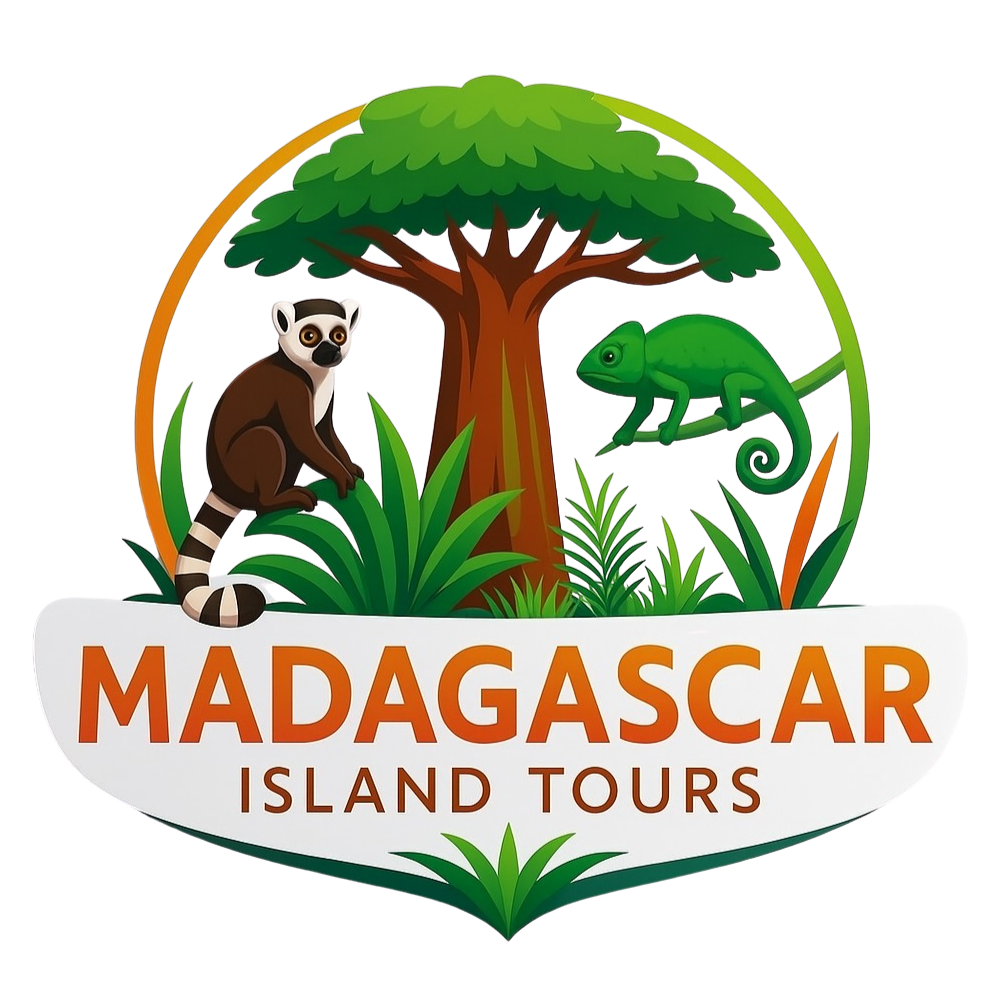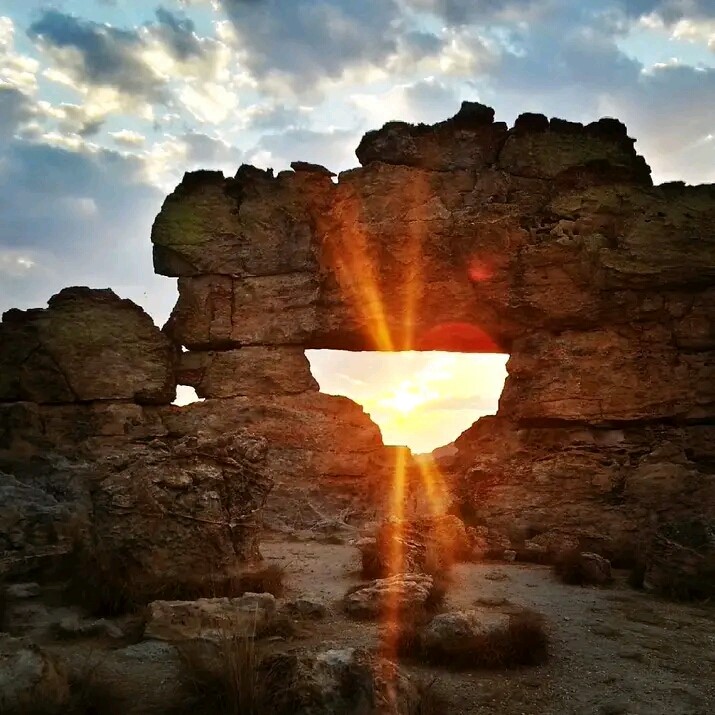Discover the natural and cultural treasures of the Great Island
Must-See Sites of Madagascar
From the bustling capital to UNESCO-listed national parks, from forests teeming with lemurs to beaches lined with lagoons, Madagascar offers a diversity unique in the world. Explore our flagship sites, selected for their beauty, history, and authenticity.
The North
Diego-Suarez (Antsiranana)

Diego-Suarez (Antsiranana)

Legendary Bay
A northern port city nestled in one of the most beautiful bays in the world. Cosmopolitan atmosphere, close to Amber Mountain and the Red Tsingy.
Must-see:
-
Diego-Suarez Bay
-
Amber Mountain (National Park)
-
Red Tsingy of Irodo
Climate:
-
May–November: dry season
-
December–April: humid and hot
Nosy Be

The Perfumed Island
A flagship destination of the northwest, Nosy Be seduces with its beaches, seabeds, and ylang-ylang plantations. Festive and authentic atmosphere.
Must-see:
-
Diving at Nosy Tanikely
-
Lokobe Reserve
-
Sunset at Mount Passot
Climate:
-
April–November: dry and sunny
-
December–March: humid
Nosy Be

The Highlands
Antananarivo

Antananarivo

Capital of the Twelve Hills
A vibrant capital perched on 12 volcanic and sacred hills of the Merina people. “Tana” for locals, it combines royal palaces such as the Rova, bustling markets, and spectacular panoramas.
Must-see:
-
The Royal Palace (Rova)
-
Croc Farm
-
Lemurs’ Park
Climate:
-
June–November: cool and dry
-
November–April: hot and humid
Antsirabe

Thermal Town and Precious Stones
170 km south of Tana, Antsirabe charms with its cool climate, hot springs, and semi-precious stone craftsmanship. It is surrounded by volcanic lakes and eucalyptus forests.
Must-see:
-
Lake Tritriva
-
Lake Andraikiba
-
Colonial downtown and historic train station
Climate:
-
April–August: cold and dry
-
August–November: hot and humid
Antsirabe

Fianarantsoa

Fianarantsoa

Cultural Capital of the Highlands
A hilltop city among vineyards, Fianarantsoa is the center of the Betsileo people. Its listed old town and traditions make it a cultural crossroads, a starting point towards Ranomafana Park.
Must-see:
-
Listed old town
-
Vineyards
-
Road to Ranomafana
Climate:
-
May–September: cool and dry
-
October–April: hot and humid
The West
Avenue of the Baobabs

Millennial Giants
A spectacular alignment of endemic baobabs, the Avenue is one of the most photographed sites in Madagascar, especially at sunset.
Must-see:
-
“Lovers’ Baobabs”
-
Sacred Baobab
-
Sunset over the avenue
Climate:
-
Accessible year-round
Avenue of the Baobabs

Belo sur Mer

Belo sur Mer

Dhows and Wild Beaches
A Vezo fishing village renowned for the traditional construction of Malagasy dhows. White sandy beaches, crystal-clear waters, and fresh seafood.
Must-see:
-
Traditional boatyards
-
Beaches and lagoon
-
Lobster tasting
Climate:
-
April–November: ideal dry season
Belo sur Tsiribihina

Sakalava Stopover
A welcoming small town in Menabe, Belo sur Tsiribihina is a practical stop before exploring the Tsingy de Bemaraha. Authentic atmosphere and warm encounters.
Climate:
-
May–November: dry and hot
-
December–April: rainy
Belo sur Tsiribihina

Kirindy Forest

Kirindy Forest

Realm of the Fosa
A 12,500 ha dry reserve, Kirindy is the ideal place to observe the fosa, Madagascar’s emblematic predator. It is also home to Berthe’s mouse lemur, the world’s smallest primate.
Must-see:
-
Night walks (nocturnal lemurs, chameleons)
-
Baobab trail
-
Fosa observation
Climate:
-
April–November: dry
-
December–March: rainy season
Miandrivazo

Crossroads of the Tsiribihina
A peaceful town in the west, Miandrivazo is the starting point for Tsiribihina river descents. Located on high ground, it overlooks the plain and serves as a logistical base for travelers before their river adventure.
Must-see:
-
Local market
-
River panorama
-
Surrounding villages
Climate:
-
April–November: ideal dry season
-
December–March: heavy rains, to be avoided
Miandrivazo

Morondava

Morondava

Gateway to Menabe
Gateway to Menabe
A peaceful coastal town, Morondava is the starting point for the Avenue of the Baobabs, Kirindy, and the Tsingy. Seaside atmosphere with markets and local fishing.
Must-see:
-
Avenue of the Baobabs
-
Kirindy Forest
-
Kivalo mangroves
Climate:
-
April–December: dry (cool to very hot)
-
January–March: rainy
Tsingy de Bemaraha

UNESCO-listed Stone Cathedrals
A unique karstic landscape, the Tsingy display forests of razor-sharp limestone, caves, suspension bridges, and exceptional wildlife: sifakas, aye-ayes, birds, and endemic reptiles.
Must-see:
-
Grand Tsingy (sporty circuit)
-
Small Tsingy (accessible to all)
-
Manambolo Gorge by canoe
Climate:
-
April–November: accessible by road
-
December–March: site closed (rains)
Tsingy de Bemaraha

Tsiribihina

Tsiribihina

River Adventure
Descending the Tsiribihina, by canoe or boat, is an immersion into wild nature. Along the way: waterfalls, gorges, Sakalava villages, crocodiles, lemurs, and aquatic birds. Camping on sandbanks offers unforgettable nights under the stars.
Must-see:
-
Waterfalls and natural pools
-
Sakalava villages
-
Wildlife observation (lemurs, crocodiles, birds)
Duration:
-
Average 2 nights / 3 days
Climate:
-
April–November: dry and ideal
-
December–March: floods and rains, not recommended
The East
Andasibe

Kingdom of the Indri
A humid tropical forest famous for the Indri-Indri, the largest lemur. Reserve of orchids, chameleons, and other lemurs.
Must-see:
-
Analamazaotra Park (Indri, sifakas)
-
Mantadia Park
-
Vakona Reserve (lemurs in freedom)
Climate:
-
April–June: cool and dry
-
July–November: humid but green
Andasibe

Ranomafana

Ranomafana

Tropical Forest and Hot Springs
A 41,000 ha humid tropical park, sanctuary of the golden bamboo lemur. Rich biodiversity, lush forests, and hot springs after the visit.
Must-see:
-
Golden bamboo lemur
-
Tanatakely, Vohiparara, Soarano circuits
-
Ranomafana hot springs
Climate:
-
April–November: ideal
-
December–March: very humid
Sainte-Marie (Nosy Boraha)

Island of Whales
Off the east coast, Sainte-Marie combines beaches, lagoons, and pirate history. World-renowned spot for humpback whale watching (June–September).
Must-see:
-
Whale watching
-
Pirate cemetery
-
Islets with secluded beaches
Climate:
-
June–September: ideal (whales)
-
October–March: more humid
Sainte-Marie (Nosy Boraha)

The South & Southwest
Andavadoaka

Andavadoaka

Authentic Marine Village
A small Vezo village on a turquoise lagoon, Andavadoaka is renowned for its seabeds and traditions. It is also one of the best spots to watch humpback whales during their migration.
Must-see:
-
Whale watching (September–October)
-
Vezo canoe outings
-
Diving and snorkeling in the lagoon
Climate:
-
April–November: dry and pleasant
-
December–March: humid
Andringitra

Trekking Paradise
A mountainous massif famous for its treks and Mount Boby (Madagascar’s 2nd highest peak). Alpine landscapes, waterfalls, and unique biodiversity.
Must-see:
-
Climb of Mount Boby
-
Valleys and waterfalls
-
Betsileo villages
Climate:
-
April–September: cool and dry
-
October–March: hot and humid
Andringitra

Fort-Dauphin (Tolagnaro)

Fort-Dauphin (Tolagnaro)

Between Sea and Mountains
A southeastern town surrounded by wild beaches and green reliefs. Direct access to Andohahela National Park.
Must-see:
-
Libanona and Vinanibe beaches
-
Andohahela Park
-
Historic Flacourt Fort
Climate:
-
April–November: dry and hot
-
December–March: frequent rains
Ifaty

Lagoon and Spiny Forest
Ifaty is a major seaside destination, between coral reefs and fishing villages. Its spiny forest shelters turtles and endemic birds.
Must-see:
-
Diving and snorkeling
-
Spiny forest and turtles
-
Vezo villages
Climate:
-
April–November: dry and hot
Ifaty

Isalo

Isalo

Canyons and Natural Pools
Canyons and Natural Pools
An 81,540 ha national park, Isalo is a mineral setting of canyons, cliffs, and natural pools. Iconic fauna: ring-tailed lemurs, sifakas, and brown lemurs.
Must-see:
-
Canyon of the Makis
-
Namaza natural pool
-
Isalo Window (sunset)
Climate:
-
April–July: dry and pleasant
-
August–October: hotter and dry
Morombe

Great Beach of the Southwest
A peaceful coastal town, Morombe is known for its immense beach and dwarf baobabs. Vezo fishermen perpetuate traditional techniques, and the local atmosphere remains authentic and welcoming.
Must-see:
-
Great beach of Morombe
-
Dwarf baobabs of the region
-
Daily life of Vezo fishermen
Climate:
-
April–November: dry and hot
-
December–March: rainy season
Morombe

Salary

Salary

Turquoise Lagoons
A coastal village renowned for its pristine beaches, coral reef, and rare baobabs. A peaceful place to dive and relax.
Must-see:
-
Beaches and lagoon
-
Vezo canoe outings
-
Baobab forests
Climate:
-
April–November: dry season
-
December–April: humid
Tuléar (Toliara)

The City of the Sun
A large port city in the southwest, Tuléar is the gateway to the beaches of Ifaty, Salary, and Anakao. Relaxed atmosphere and colorful markets.
Must-see:
-
Port and local market
-
Beaches of Ifaty, Anakao
-
Sea Museum
Climate:
-
Year-round: hot and sunny
-
December–March: possible rains
Tuléar (Toliara)


